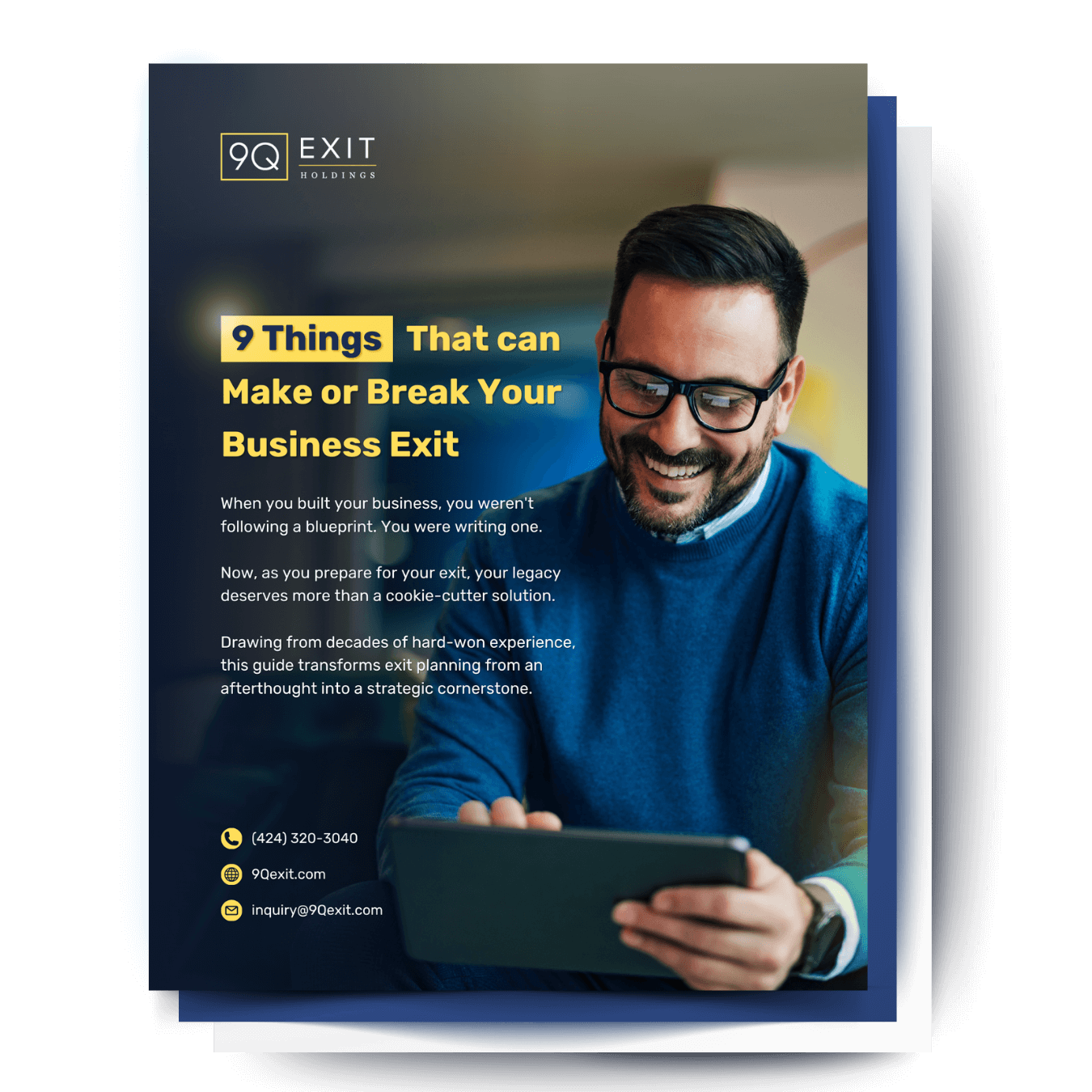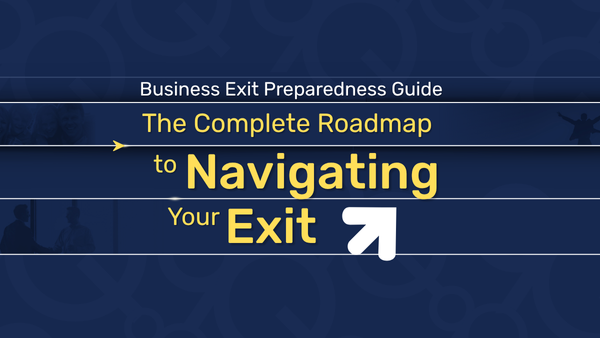The M&A landscape has fundamentally shifted in the last decade. Strategic buyers are becoming increasingly rare, with private equity and other financial buyers now dominating the space for most industries. According to current market data, as much as 80% of M&A deals are currently being transacted by private equity. For companies like those in 9Q Exit’s portfolio preparing for strategic exits, understanding these distinct buyer types isn’t just valuable insight but critical intelligence for maximizing transaction success.
The Core Philosophy Divide

The fundamental difference between private equity and strategic buyers lies in their motivation and approach to value creation.
Strategic buyers are companies seeking to acquire businesses that align with their operational goals. They’re plugging gaps in their business, expanding into new markets, or eliminating competition. Their motivation transcends pure financial returns, often justifying higher purchase prices through anticipated synergies.
Private equity buyers approach acquisitions as investments with a clear financial objective: generate substantial returns within a 3 to 7 year investment horizon. They focus on businesses with strong cash flows and growth potential that can be improved operationally and eventually sold for a significant profit.
Valuation Methodology: The Numbers Game

Strategic Buyer Approach
Strategic buyers leverage their industry knowledge and operational synergies to justify premium valuations. They evaluate acquisitions based on revenue synergies from expanded customer reach and cost savings from eliminating redundant functions. They also assess strategic synergies, including competitive positioning and market expansion opportunities. Strategic buyers often pay the highest multiples because they can realize immediate operational benefits after acquisition. They also gain access to broader resources that accelerate growth beyond what the target company could achieve independently.
Private Equity Approach
Private equity firms employ rigorous financial analysis focused on leveraged buyout modeling that emphasizes cash flow generation and debt repayment capacity. The use of leverage significantly enhances their internal rate of return but requires disciplined financial projections. PE firms focus on operational improvements they can implement including margin expansion, efficiency improvements, and growth acceleration through capital and expertise, while backward calculating from anticipated exit valuations.
Due Diligence: Depth vs. Speed

Strategic Buyer Due Diligence
Strategic buyers often conduct more focused due diligence due to their industry expertise. They concentrate on industry dynamics, competitive positioning, customer overlap assessment, and cultural fit evaluation. Strategic buyers can move faster through due diligence because they understand the business model and industry risks, potentially completing the process in 4 to 6 weeks while focusing on confirming anticipated synergies rather than fundamental business model validation.
Private Equity Due Diligence
PE firms conduct more comprehensive financial due diligence, including exhaustive analysis of historical financial performance, quality of earnings reports from independent third party firms, and detailed revenue and cost structure breakdowns. PE due diligence typically spans 6 to 12 weeks, reflecting their need to thoroughly understand every aspect of the business since they lack industry specific operational knowledge. They also conduct extensive management team evaluations since PE firms often retain existing leadership.
Timeline Expectations and Deal Structure

Strategic Buyer Advantages
Strategic buyers offer faster decision making through internal capital availability that eliminates external financing contingencies, industry expertise that accelerates evaluation, and fewer regulatory constraints. The average strategic buyer transaction can close in 90 to 150 days from LOI to completion. They typically offer 70% to 100% cash deals with minimal earn out provisions since they control integration and can realize synergies independently.
Private Equity Considerations
PE deals require coordination with banks and debt providers, adding 2 to 4 weeks to the transaction timeline. They also require investment committee approvals at multiple stages. However, this financing discipline often results in more realistic valuations for both buyers and sellers. PE firms frequently structure deals with 20% to 40% rollover equity for sellers. This gives sellers a “second bite of the apple” opportunity to join future value creation. They also benefit from performance-based components and clear secondary liquidity timelines.
Integration Philosophy: Control vs. Growth

Strategic Integration
Strategic buyers typically integrate acquired companies into their existing structure, potentially eliminating redundant functions and consolidating operations. Acquired businesses often adopt the parent company’s culture, systems, and processes, with strategic buyers planning to retain acquisitions indefinitely as part of their broader corporate strategy.
Private Equity Growth Strategy
PE buyers often maintain existing management teams and operational independence while providing capital and strategic guidance. PE firms frequently use initial acquisitions as platforms for additional “bolt on” acquisitions to accelerate growth and build scale, investing in systems, processes, and talent to prepare the business for eventual sale to strategic buyers or other PE firms.
Industry Specific Considerations

Software and technology sectors see PE firms representing nearly 60% of tech M&A deals. They bring specialized knowledge of SaaS metrics and scaling methodologies. Healthcare and services industries often see strategic buyer dominance due to regulatory complexity. This dominance also comes from the importance of existing relationships and compliance frameworks. Manufacturing and industrial sectors attract both buyer types. Strategic buyers focus on supply chain integration, while PE firms target operational efficiency improvements.
Maximizing Your Exit Strategy

Understanding these distinct approaches enables business owners to tailor positioning to resonate with their preferred buyer type, optimize timing based on whether strategic buyers might move faster or PE buyers might offer better long term upside, prepare documentation to anticipate the appropriate level of due diligence scrutiny, and negotiate structure by understanding trade offs between immediate cash and future upside participation.
As a strategic acquirer, we understand both buyer mentalities and can offer target companies insights into optimizing their positioning for various buyer types. For strategic sales, we emphasize operational synergies, market positioning, and strategic value that transcends pure financial metrics. For PE preparation, we focus on sustainable cash flow generation, scalable operational processes, and management team development that appeals to investment focused buyers.
Conclusion
The choice between strategic and private equity buyers isn’t just about valuation but about aligning your personal goals, risk tolerance, and vision with the right buyer’s approach. Strategic buyers offer operational synergies and often higher immediate valuations, while PE buyers provide growth capital and continued participation in value creation.
The most successful exits occur when business owners understand these fundamental differences and position their companies to appeal to the buyer type that best matches their objectives. In today’s PE dominated market, companies that can appeal to both buyer types often find themselves in the strongest negotiating position, creating competitive tension that ultimately maximizes both valuation and terms.
9Q Exit combines the strategic perspective of an industry buyer with the financial discipline of an investment focused approach, offering target companies the benefits of both acquisition philosophies in our partnership oriented transactions.







